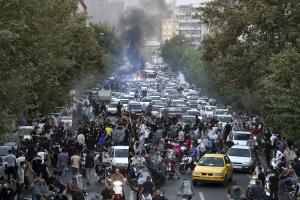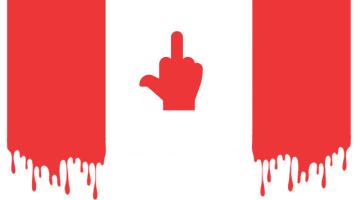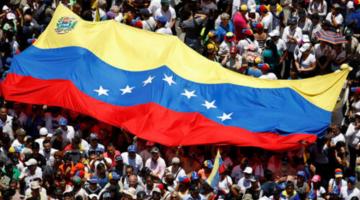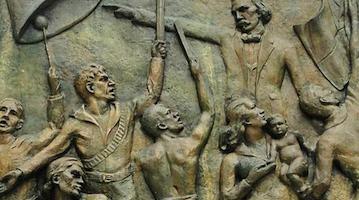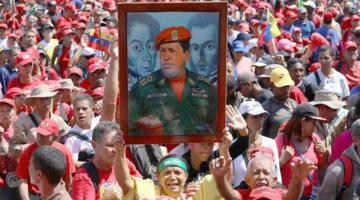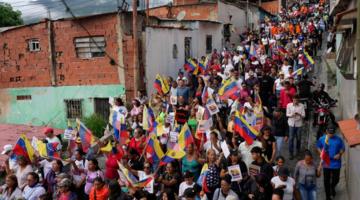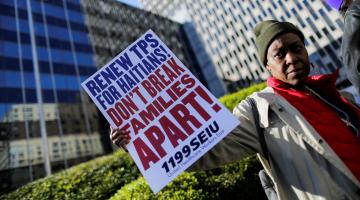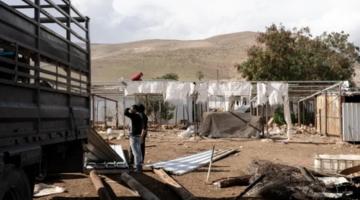The United States is a colonial empire, repressing and exploiting colonized peoples domestically and internationally. Mass deportations are a function of ethnic cleansing and a continuation of U.S. settler colonial history.
The Trump raids have begun. In many ways, nothing is new. Despite liberals’ best attempts at depicting Trump’s policy as qualitatively different, what we are witnessing is merely an intensification of the bipartisan U.S. deportation regime.
In other words, “mass deportation” chants might be new, but mass deportations aren’t. During his first term in office, Trump deported fewer people than all previous three administrations. Later, Biden deported twice as many people as Trump. The only thing that substantively changes under the latter is the visibility of these processes. In short, liberals now care. Time for new photo-ops and selective outrage—if that.
Borders, tools of neocolonialism
Independent of liberal outrage, however, the border has long been alive and well. Under both Democrats and Republicans, it has efficiently served its main function: to create a pliable and cheap workforce. A workforce whose condition is best captured by the notion of deportability: the permanent fear of being persecuted for coming from elsewhere, of being profiled and disappeared in a cage, across a fence, or, now, in Guantanamo. You are much less likely to claim your rights—however meager—if interacting with authorities might get you detained or deported. You are much less likely to demand better pay—or to demand anything at all, for that matter—if the threat of la migra can be used by your boss or any self-deputized citizen.
Deportation and immigration enforcement, then, amount to a huge act of class discipline. Deportability produces the immigrant as a racialized underclass, like carceral power and structural racism does with Black Americans. It is the well-known enforcement of the color line, as W.E.B. Du Bois and others like Charisse Burden Stelly have put it, through terror—to recreate international wage hierarchy and structural immobility for particular populations in the core. It is one among the many mechanisms that have enabled the renovation of racial power in the past half century, one of the key instruments of White Reconstruction and the transition to neo-colonial rule.
Beyond cheap labor: ethnic cleansing
But the visibility and intensification of raids under Trump make an additional point clear. Deportation, mass or not, is an act of ethnic cleansing. It is the deliberate removal of people based on their ethno-national affiliation. That this hides behind racialized constructs of “citizenship” or “criminality” (which lose all their meaning when mere entry is a crime and people of color are structurally criminalized) is besides the point. The fact of racialized removal is the point.
Indeed, the similarities between home raids in the West Bank of Palestine and the Bronx are not just coincidence. (That Trump might bomb Mexico or invade Panama like Israel bombs and invades Palestine is but the other side of the same colonial coin). These possess a structural equivalence that needs to be reckoned with.
As in occupied Palestine, structural mass removal serves to cohere the settler colonial project and its class blocs. First and foremost, it works to restrict access to the entitlements of its privileged global North citizenship—themselves differentially distributed among its internal class and racial strata. A citizenship whose entitlements, admittedly, have been in long-term decline under the pressures of neoliberalism and secular economic stagnation, from wages to rights. But a privileged citizenship nevertheless, one that millions across the Global South aspire to.
Make no mistake—the elevation of mass deportation from disavowed policy to the status of cultural symbol is a sign of crisis. A sign that core ruling classes, unable or unwilling to pacify their masses through concessions or redistribution, need to find outlets for popular rage. A sign that capital is increasingly unable to safeguard even the basis of its power since at least 1945: the pacification of the imperial core. Mass deportation should be understood, in this sense, as a measure related fundamentally to the growingly precarious production of social peace in Northern societies.
In this light, just as Native and Black Americans were and are constantly removed and enclosed, so are immigrants—many of them, indeed, “indigenous.” Like Palestinians, then, their mass removal, gradual or sudden, invisible or spectacular, conservative or liberal, is an instrument of colonization.
Mass deportation as misnomer
In other words, like Dylan Rodriguez tells us for “mass incarceration”, mass deportation is a misnomer. It is not simply a removal of “aliens.” Like racial categories before, now naturalized state categories like “alien” hide the demarcation of populations for particular purposes: genocide, enslavement, or, today, removal—more precisely, super-exploitation under threat of removability.
“Mass deportation” and immigration enforcement, then, safeguard the imperial entitlements of the “citizen”, however hollow and internally stratified these might be. In doing so, “mass deportation” is the continuation of a project of conquest—conquest by other means. A conquest that responds to changing conditions—the goal today being not the taking of land, but the guarding of the established class-race bloc of Global North labor aristocracy—but a conquest nevertheless.
In the final analysis, of course, conquest is war. In his recent Black radical masterpiece Tip of the Spear, Orisanmi Burton argues that prisons are war. Recovering the organic thought of 20th century imprisoned Black revolutionaries, he demystifies the liberal framework by which the prison is a neutral institution of the law that confines “criminals”. Similarly, the border is not a neutral institution geared against “aliens” or “illegals”. Rather, to use Burton’s pithy phrase: borders are war.
We can think of “mass incarceration” and “mass deportation”—misnomers in their liberal reformism but still functional as empirical descriptors—as twin dynamics of conquest. Along with reservations and ongoing indigenous elimination, both apparatuses and their many and overlapping expressions—police, prisons, ICE, borders, detention, deportation—materially reproduce the subjugated race-class position of nonwhite citizen and immigrant populations. Both contain and regulate the presence of potentially antagonistic surplus populations. And both disappear unwanted bodies to safeguard the entitlements of nominally post-racial settler citizenship, continuing to racialize access to the labor aristocracy.
That borders are war is not simply a metaphor. “Mass deportation” is the continuation of a long war of conquest. For it is the same state and parastate powers—supported by similar, if diversified, class alliances—using similarly targeted and organized mass violence to maintain the loot of centuries. The same populations whose mobility—literal and social—is seen as a threat to order, despite the abundance of multiculturalist incantations.
Imperial and imperialized nations
In the meantime, Trump’s escalation has been met by leftist leaders throughout Latin America with national-popular demands, from simple calls for migrant dignity to threats on US military power. While most have ultimately come to agreements with Trump after initial standoffs, reactions by Colombian president Gustavo Petro, Honduras president Xiomara Castrom and Mexico’s president Claudia Sheinbaum make one thing abundantly clear: that the national question of the peripheries is inextricable from emigration to the core. The oppression of the nations of the Global South is one and the same with the oppression of immigrants in the North—the international and domestic sides of the same imperialist phenomenon. As Amilcar Cabral once wrote, neocolonialism is “at work on two fronts”—core and periphery. National liberation in late neocolonial times, then, is intimately bound with the core’s migrant question.
In the heart of the empire, meanwhile, the colonial question—domestic or international—is never on the ballot. “Mass deportation” is bipartisan policy. “Mass incarceration” and police funding are not substantially challenged by either party—whatever their rhetoric. Indeed, as liberal antiracism sides with genocide, we come to the conclusion that antiracism without anti-imperialism is simply white supremacy in a more sophisticated form—“disguised” and “calculated”, as George Jackson may have it. Finally, genocide in Gaza, the second cold war with China, and the neoliberal plunder of the South by U.S. monopolies are not even in question—on the contrary, parties compete in hawkishness. Only rhetoric changes.
In short, white supremacy is not up for election—never has been. Neither is, for that matter, even the tamest anti-neoliberal redistribution. Only demons and demented empire. May it fall in its senility, and with it, the ongoing escalation of ethnic cleansing hidden under other names.
Iker Suárez is an author and PhD researcher at the CUNY Graduate Center. He studies neocolonialism in Southern Europe and organizes with CUNY for Palestine.

